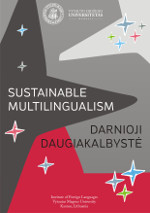ON ENGLISH IT FIELD BORROWINGS IN MODERN RUSSIAN
ON ENGLISH IT FIELD BORROWINGS IN MODERN RUSSIAN
Author(s): Aušra Janulienė, Justina AndriulaitytėSubject(s): Eastern Slavic Languages, Philology, Translation Studies
Published by: Vytauto Didžiojo Universitetas
Keywords: corpus linguistics;English borrowings;IT terminology in Russian;lexical addition;lexical replacement;synonymy
Summary/Abstract: Language is a reflection of society, which is developing with alterations in political, economic, and social spheres. As a result, some words lose their importance and fade into obscurity, whereas others come into existence. Despite the fact that the occurrence of borrowings is a global phenomenon, some spheres are more prone to accept foreign words, the dynamic IT field among them. As the USA have been leaders in the technical sphere for many years, the majority of the words describing IT concepts are of the American origin. Having entered the receiving language, some loan words may alter the meaning in order to avoid lexical competition and survive. To establish whether any semantic changes occurred, borrowings and their native counterparts have to be analyzed according to dictionary definitions as well as their contexts. Thus the aim of the present research was to analyze the issues of synonymy as well as the usage and meaning differences of English borrowings (nouns) of the IT field in the Russian language and their native counterparts. In order to perform the analysis, quantitative as well as qualitative research methods were applied. The quantitative method, particularly a corpus-based research, was employed while checking frequency and collecting the most frequent collocates of the loan words. The analysis of raw frequencies in the Russian National Corpus revealed that 21 loan words are widespread, whereas 25 of them are occasional. The majority of the loan words were found to be semantically narrowed. The analysis revealed that not a single one is in lexical competition with native Russian lexemes, since all of them are results of lexical addition rather than replacement.
Journal: Darnioji daugiakalbystė
- Issue Year: 2016
- Issue No: 8
- Page Range: 81-100
- Page Count: 20
- Language: English

